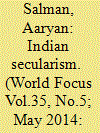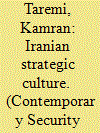| Srl | Item |
| 1 |
ID:
130827


|
|
|
|
|
| Publication |
2014.
|
| Summary/Abstract |
"I believe in a religion based on universal and all-embracing principles which have always been accepted as true by mankind - the primeval eternal an religion, which means that it is above the hostility of all human an creels whatsoever. " - -Swami Dayananda Saraswati. There can be little debate on the In?uence of co Religion on Human History. The overwhelming impact of Christianity, Hinduism, Zoroastrianism, Judaism, or Islam on Civilization is seen not only in the cultural pl: semblance and value system which emerge from their - D2 teachings, but also re?ects in the effects they've had Ul on mankind. un an Believers and Unbelievers alike have acknowledged the profound in?uence of religion on ha individuals, societies and on humanity's collective life. the Religion was and is a power that's here to stay with above both the western and eastern hemispheres! that will On the other hand, Religion was and is still the considered a pariah' by Western Secularism! According are to historian R. Scott Appleby "Religion, at last, can no be longer be ignored". This was one of ?ve "unintended, unforeseen" consequences of 9/ l 1. HI In present day, challenges are manifold both co at domestic and at international level. Most political of con?icts end up passing through the prism of religion» pr. or ethnicity and are claimed to be the trigger factor in cl: many con?icts. The relationship between Religion and special Con?ict is complex.3'And Religion is at the heart of the Secularism Debate as Ethnicity and Religion have been an the building blocks of an lndividua1's Identity. Appleby hi: de?ned religion as 'the human response to a reality m: perceived as sacred
|
|
|
|
|
|
|
|
|
|
|
|
|
|
|
|
| 2 |
ID:
129667


|
|
|
|
|
| Publication |
2014.
|
| Summary/Abstract |
This article attempts to deepen our understanding of how state ideology, as a component of strategic culture, influences the manner in which states approach the use of violence. In that context, it examines the influence of Shiite Islam on the way that post-revolutionary Iran has employed force in its own defence. It argues that the influence of religion on Iranian strategic culture has been extensive. Islam has largely shaped the regime's perceptions of international relations, as well as how Iran should relate to the outside world. It has resulted in a highly revisionist foreign policy which attempts to remake the world in its own image. This orientation has left Iran internationally isolated and driven it to rely as far as possible on its own resources for its defence. It has also inclined Iran to forge closer relations with Islamic movements in the Middle East to compensate for the lack of allies among states. Islam has also prompted the regime to adopt deterrence by denial as the cornerstone of its military strategy. This military strategy renounces the use of force for material gain and condones it only when employed for the defence of the homeland and the wider Muslim community. However, it is still willing to strike pre-emptively if need be and take the fight to the enemy should Iran be attacked. Islam has also led Iran to emphasize faith and fighting spirit, over numbers and technology as the determining factors in war because it perceives victory as a divine gift bestowed on those who fight for Allah.
|
|
|
|
|
|
|
|
|
|
|
|
|
|
|
|